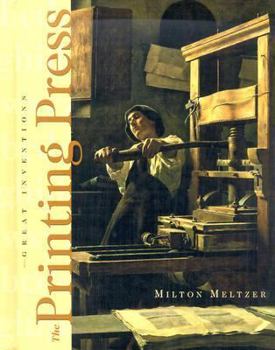The Printing Press
(Part of the Great Inventions Series)
Explains the mechanics of the first printing press, invented in Germany by Gutenberg in the fifteenth century, and describes the press's revolutionary impact on the world.
Format:Library Binding
Language:English
ISBN:076141536X
ISBN13:9780761415367
Release Date:January 2005
Publisher:Cavendish Square Publishing
Length:125 Pages
Weight:1.25 lbs.
Dimensions:0.6" x 7.8" x 9.8"
Age Range:13 to 17 years
Grade Range:Grades 8 to 12
Customer Reviews
1 rating
The history of the printing press as a great invention
Published by Thriftbooks.com User , 20 years ago
The Great Inventions series looks at the creation and impact of some of the most important inventions of all time, and this volume is devoted to "The Printing Press." Milton Meltzer explains the mechanics of the first printing press invented by Gutenberg in Germany in the 15th century and explores the revolutionary impact its creation had on the world in those five centuries. Of course, the fact students are holding this book in their hands sort of proves Meltzer's point.Meltzer provides a larger perspective on the invention of the printing press, going back to the how the ability of human beings to speak eventually led to the creation of writing from cave drawings and hieroglyphics to cuneiform and ideograms. However, it is when the transition from stone and clay to papyrus and paper is made that the stage is set for the invention of the printing press. Meltzer also looks at the early methods of printing employed by the Chinese before Gutenberg made his printing press. The details of the process are covered and there is even a sidebar that explains why historians have to hedge some of their description of the development of printing because of the scare documentary evidence (they were too busy printing books on the new invention to write about inventing it). This section is illustrated with a page from the Gutenberg Bible (it does not say which one) and such details as that his average print run was about 500 copies, although his Bible, published in two volumes, had a run of 300 copies, each volume selling for 30 florins (three years of a clerk's wages). The rest of this book is devoted to the way the printing press changed the world looking at the explosion of printing that followed, the impact print shops had on culture, and the process by which apprentice printers became master. A later chapter looks at some of the famous American writers who started out as printers: Benjamin Franklin, Walt Whitman, and Sam Clemens. One of the most interesting chapters covers the immense impact that the printing press had on science in terms of making scientific studies more readily available and spreading knowledge to far wider circles as books, periodicals, papers, letters, maps, graphs, and diagrams were disseminated. Other chapters look at how the printing press helped spread religious and political ideas, giving many voices a chance to be heard. The chapter on "The Power of Print" is devoted to the abolitionist press that printed the words of Frederick Douglass and William Lloyd Garrison.The final chapter quickly covers over two centuries as printing was reshaped by the forces of the Industrial Revolution, from the first all iron printing press made in 1798 and the invention of lithography to the innovations of the power press, photography, and the photocopier. Overall Meltzer covers a lot of ground in terms of the history of printing, which means he has to sacrifice depth. But the result is a solid introduction to this topic, which does a





